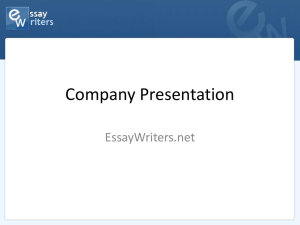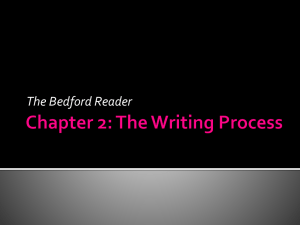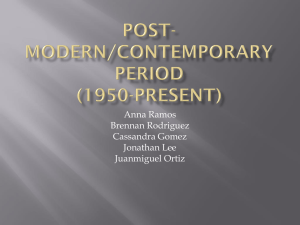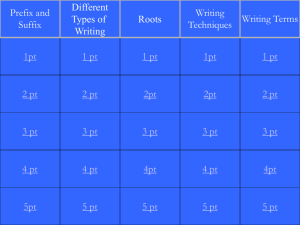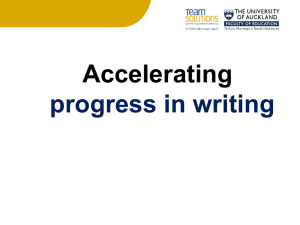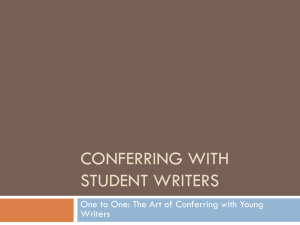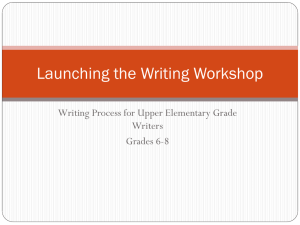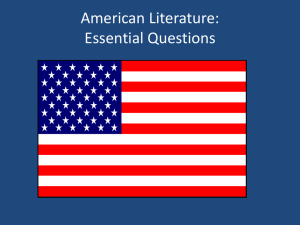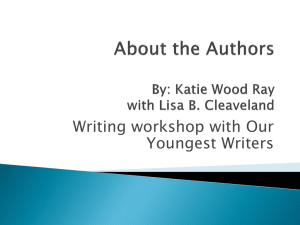Critical Reading Quiz 1 (Fall 2014) READING Please read the
advertisement
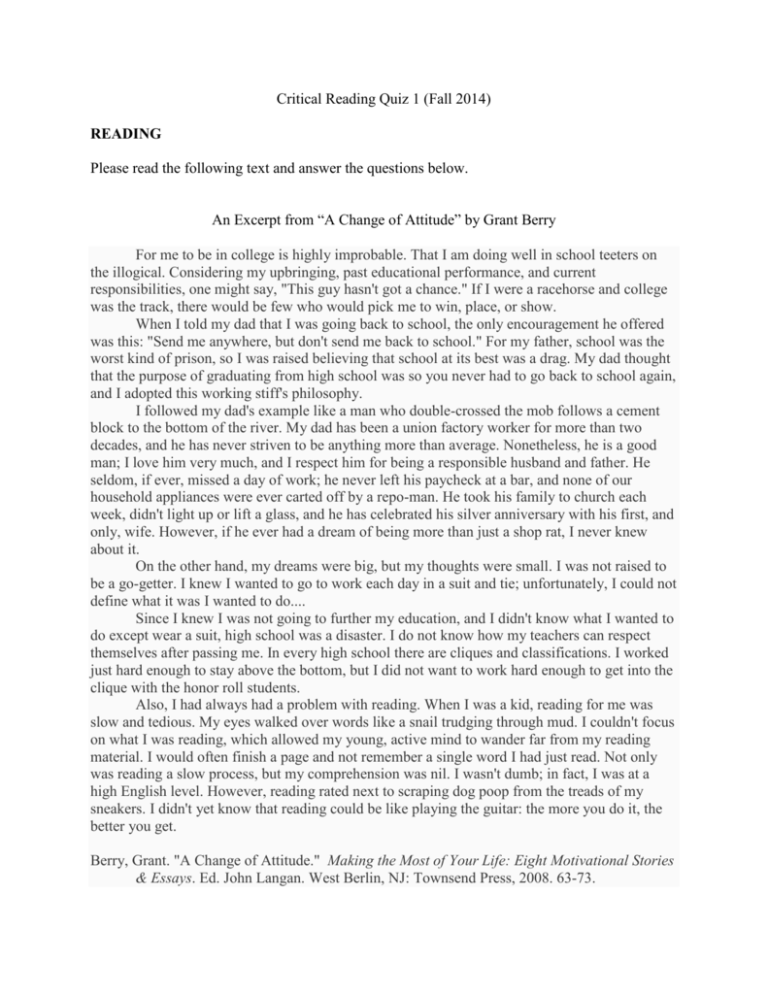
Critical Reading Quiz 1 (Fall 2014) READING Please read the following text and answer the questions below. An Excerpt from “A Change of Attitude” by Grant Berry For me to be in college is highly improbable. That I am doing well in school teeters on the illogical. Considering my upbringing, past educational performance, and current responsibilities, one might say, "This guy hasn't got a chance." If I were a racehorse and college was the track, there would be few who would pick me to win, place, or show. When I told my dad that I was going back to school, the only encouragement he offered was this: "Send me anywhere, but don't send me back to school." For my father, school was the worst kind of prison, so I was raised believing that school at its best was a drag. My dad thought that the purpose of graduating from high school was so you never had to go back to school again, and I adopted this working stiff's philosophy. I followed my dad's example like a man who double-crossed the mob follows a cement block to the bottom of the river. My dad has been a union factory worker for more than two decades, and he has never striven to be anything more than average. Nonetheless, he is a good man; I love him very much, and I respect him for being a responsible husband and father. He seldom, if ever, missed a day of work; he never left his paycheck at a bar, and none of our household appliances were ever carted off by a repo-man. He took his family to church each week, didn't light up or lift a glass, and he has celebrated his silver anniversary with his first, and only, wife. However, if he ever had a dream of being more than just a shop rat, I never knew about it. On the other hand, my dreams were big, but my thoughts were small. I was not raised to be a go-getter. I knew I wanted to go to work each day in a suit and tie; unfortunately, I could not define what it was I wanted to do.... Since I knew I was not going to further my education, and I didn't know what I wanted to do except wear a suit, high school was a disaster. I do not know how my teachers can respect themselves after passing me. In every high school there are cliques and classifications. I worked just hard enough to stay above the bottom, but I did not want to work hard enough to get into the clique with the honor roll students. Also, I had always had a problem with reading. When I was a kid, reading for me was slow and tedious. My eyes walked over words like a snail trudging through mud. I couldn't focus on what I was reading, which allowed my young, active mind to wander far from my reading material. I would often finish a page and not remember a single word I had just read. Not only was reading a slow process, but my comprehension was nil. I wasn't dumb; in fact, I was at a high English level. However, reading rated next to scraping dog poop from the treads of my sneakers. I didn't yet know that reading could be like playing the guitar: the more you do it, the better you get. Berry, Grant. "A Change of Attitude." Making the Most of Your Life: Eight Motivational Stories & Essays. Ed. John Langan. West Berlin, NJ: Townsend Press, 2008. 63-73. QUESTIONS 1) Which sentence best states the main idea of this text? A. B. C. D. The author did not work very hard in high school. The author found his father uninspiring. The author faced several obstacles in seeking to achieve his goals. The author struggled with reading comprehension. 2) The tone of this text can be best described as…. A. B. C. D. Outraged Sad Thoughtful Cheerful 3) When writing about his father in the third paragraph, the author states, “He seldom, if ever, missed a day of work; he never left his paycheck at a bar, and none of our household appliances were ever carted off by a repo-man.” The above sentence is a statement of A. Fact B. Opinion C. Fact and Opinion 4) As used in the third paragraph, the word “rat” most nearly means…. A. B. C. D. Low-ranking person Someone who does a lot of shopping Small rodent Double-crosser 5) The primary purpose of this text is… A. B. C. D. To belittle the author’s father. To emphasize the importance of wearing a suit and tie. To explain how the author came to be a college student. To demonstrate that school is a drag. 6) The author’s message arises from which of these assumptions? A. B. C. D. E. Joining a clique can lead to better reading skills. Betting on racehorses can lead to more earnings. Working in factories can lead to fewer job absences. All of the above. None of the above. 7) A conclusion that can be drawn from this text is that… A. B. C. D. E. Reading is just something you understand how to do or you don’t; it can’t be learned. There’s only one path to academic success. Big dreams can sometimes only be achieved by first taking small steps forward. All of the above. None of the above. 8) The author implies that… A. B. C. D. E. Parents and peers can be strong influences. Reading skills can be strengthened with practice. Past academic failure does not prevent future academic success. All of the above. None of the above. 9) The title of this piece of writing is “A Change of Attitude.” Which of the following does the author demonstrate a positive attitude toward? A. B. C. D. E. His high school teachers. His father. His father’s “philosophy.” All of the above. None of the above. 10) If this piece of writing were to continue, which of the following topics should you most expect to be addressed? A. B. C. D. Why the author’s father didn’t like school. The differences between the bottom students and the honor roll students. What the author did in order to get better at reading. Who gets to wear a suit and tie to work. Critical Reading Quiz 2 (Fall 2014) READING Please read the following text and answer the questions below. An Excerpt from “The Inspired Writer v. the Real Writer” by Sarah Allen Several years ago, in a first year writing course, a student nervously approached me after class, asking if we could talk about her latest draft of a formal paper. She was worried about the content of the draft, about the fact that in writing about her writing process (the assignment for the paper), she found her tone to be at best frustrated, at worst grumbling and whiney. “I don’t really like writing. Is that okay?” she asked. This is the first time that I remember a student confessing aloud (to me) that she did not like writing, and I remember struggling for an appropriate response—not because I couldn’t fathom how she had the gall to admit this to me, a writing teacher, but because I couldn’t understand why admitting to not liking writing worried her. In the next class, I asked my students if they liked writing. I heard a mixed response. I asked them if they assumed that someone like me, a writing teacher/scholar, always liked writing. The answer was a resounding “yes.” I rephrased, “So you believe that every day I skip gleefully to my computer?” Again, though giggling a bit, my students answered “yes.” And, at last, one student piped up to say, “Well, you’re good at it, right? I mean, that’s what makes you good at it.” My student, quoted above, seems to suggest that I am good at writing because I like doing it. But I’d have to disagree on at least two points: First, I wouldn’t describe my feelings toward writing as being a “like” kind of thing. It’s more of an agonistic kind of thing. Second, I am not “good” at writing, if being good at it means that the words, the paragraphs, the pages come easily. On the contrary, I believe that I write because I am driven to do so—driven by a will to write. By “will,” I mean a kind of purposefulness, propensity, diligence, and determination (which, I should mention, does not lead to perfection or ease . . . unfortunately). But, I should qualify this: the will to write is not innate for me, nor is it always readily available. In fact, the common assumption that a will to write must be both innate and stem from an ever-replenishing source never ceases to surprise (and annoy) me. I’ve worked with a lot of enviably brilliant and wonderful writers—teachers, students, scholars, and freelancers. I’ve yet to meet one who believes that she/he is innately and/or always a brilliant writer, nor have I met one who says she/he always wants to write. Allen, Sarah. “The Inspired Writer vs. the Real Writer.” Writing Spaces: Readings on Writing. Vol. 1. Eds. Charles Lowe and Pavel Zemliansky. West Lafayette, IN: Parlor Press, 2010. 34-44. QUESTIONS 1) Which sentence best states the main idea of this text? A. B. C. D. A student once asked the author if they could talk about a paper the student had drafted. Successful writers often struggle and don’t feel like writing. Enjoying writing is essential to being good at it. Motivation to write must come from within you. 2) The tone of this text can be best described as…. A. B. C. D. Outraged Sad Thoughtful Cheerful 3) About the many successful writers she’s met, the author says, “I’ve yet to meet one who believes that she/he is innately and/or always a brilliant writer, nor have I met one who says she/he always wants to write.” The above sentence is a statement of A. Fact B. Opinion C. Fact and Opinion 4) As used in the second paragraph, the word “fathom” most nearly means…. A. B. C. D. Understand Hate Hear Reply 5) The primary purpose of this text is… A. B. C. D. To explain why some writing is good and some is not. To suggest that the author is a great teacher. To explore the feelings successful writers have about themselves and their work. To tell a story. 6) The author’s message arises from which of these assumptions? A. B. C. D. There is only one true method of becoming a better writer. Writers should always feel confident about their writing. Successful writing can be produced in lots of different ways. All of the above. E. None of the above. 7) A conclusion that can be drawn from this text is that… A. B. C. D. E. Writing ability is pre-determined: either you have it, or you don’t. Writing is always difficult. Strong writers never doubt themselves. All of the above. None of the above. 8) The author implies that… A. B. C. D. E. Strong writing doesn’t necessarily stem from natural ability. It’s okay not to like writing. Good writers don’t always enjoy writing. All of the above. None of the above. 9) The title of this short excerpt is “The Inspired Writer vs. the Real Writer.” Now that you’ve read the excerpt, which of the statements below best expresses the title’s meaning? A. B. C. D. E. Real writers may not be inspired writers. Real writers are never inspired writers. Real writers get in fights with inspired writers. All of the above. None of the above. 10) If this piece of writing were to continue, which of the following topics should you most expect to be addressed? A. B. C. D. Why it’s important to cite sources. How uninspired writers get their work done. When readers respond to writers. What questions students ask most frequently.
